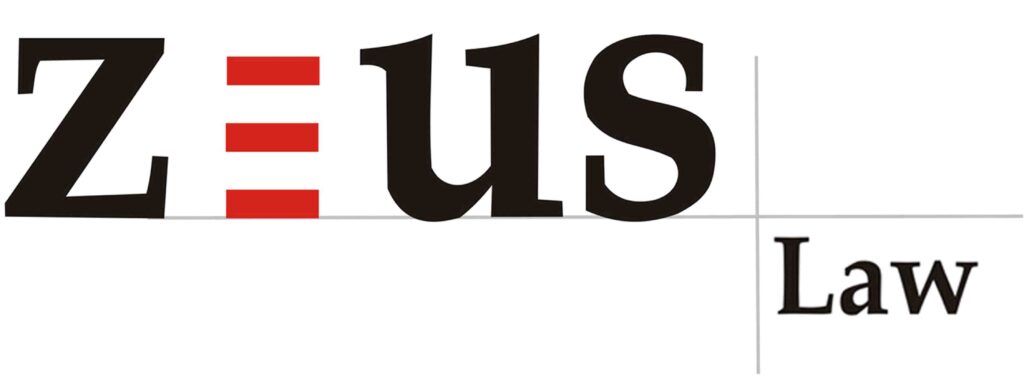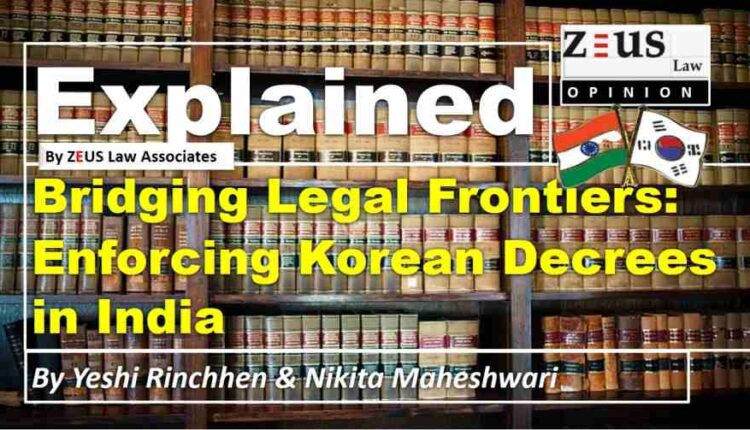Bridging Legal Frontiers : Enforcing Korean Decrees In India
EXPLAINED by: Yeshi Rinchhen & Nikita Maheshwari, ZEUS Law Associates
As businesses transcend borders, the need for efficacious mechanisms to uphold rights and obligations across jurisdictions becomes vital. In this tapestry of global commerce, the enforcement of foreign decrees assumes paramount importance.
Within the legal landscape of India, a robust framework exists to facilitate the recognition and enforcement of foreign decrees, judgements and arbitral awards, including those originating from the Republic of Korea (‘Korea’).
The present article, which is Part – II of a series of two articles, delves into the procedural nuances and practical considerations involved in enforcing foreign decrees, with a special focus on Korean decrees, within the Indian jurisdiction. The Part – I sheds light on the enforcement of Indian Court decrees in Korea, highlighting the legal framework, challenges and opportunities for enhancing bilateral legal cooperation between the two nations.
Legal Framework:
India has executed bilateral treaties with various countries regarding reciprocity in enforcement of judgments and decrees. Whenever any such treaty is entered into with any country, that country is declared a reciprocating territory by the Indian government by way of a notification in the Official Gazette. At present, India has reciprocity with only 12 nations, namely, (i) the United Kingdom, (ii) Aden, (iii) Fiji, (iv) Republic of Singapore, (v) Federation of Malaya, (vi) Trinidad and Tobago, (vii) New Zealand, (viii) Cook Islands (including Niue) and the Trust Territories of Western Samoa, (ix) Hong Kong, (x) Papua and New Guinea, (xi) Bangladesh and (xii) the United Arab Emirates. It is important to mention that despite strong diplomatic and socio-economic ties, no reciprocal relationship exists between India and Korea.
Within the Indian legal panorama, the enforcement of foreign decrees is guided by the provisions outlined in the Code of Civil Procedure, 1908 (‘the Code’) and the execution of foreign arbitral awards is primarily governed by the Arbitration and Conciliation Act, 1996 (‘the Act’). Additionally, India is a signatory to the New York Convention on the Recognition and Enforcement of Foreign Arbitral Awards (1958) and the Geneva Convention on the Execution of Foreign Arbitral Awards (1927), which further facilitate the enforcement of foreign arbitral awards.
In terms of Section 44A of the Code, a foreign decree of any of the superior Courts of any reciprocating territory may be executed in India as if it had been passed by a District Court in India. A foreign judgment which is final and conclusive under Section 13 of the Code may be enforced by instituting execution proceedings under Section 44A of the Code in the case of reciprocating territories or by instituting a civil suit on the judgment in the case of non-reciprocating territories. According to Section 13 of the Code, a foreign judgment will not be conclusive if it :
- is pronounced by a Court that was not of competent jurisdiction;
- is not given on the merits of the case;
- appears to be founded on an incorrect view of international law or a refusal to recognize Indian law (where applicable);
- violates principles of natural justice;
- is obtained by fraud; or
- sustains a claim founded on a breach of Indian law.
It is to be noted that the Code deals only with the enforcement of foreign decrees / judgements, and not foreign arbitral awards.
Procedure for Enforcement:
In case of a final and conclusive decree passed in the Court(s) of a reciprocating territory, the Decree Holder must file an application for the execution of such a decree, along with the certified copy of the decree and a certificate from the concerned Foreign Court stating the amount, if any, that has been satisfied under the decree. The executing Court in India will thereafter issue a show cause notice to the Judgement Debtor who has the right to object to the enforcement of the foreign decree. If no objections are raised, the Court will recognize and enforce the foreign decree as if it were a judgement of the Indian Court against the assets of the Judgement Debtor. It is to be noted that the decree sought to be enforced must be final and conclusive after all available appeals have been exhausted in the foreign territory.
However, since India does not have reciprocity with Korea, a judgement passed by a Korean Court only acts as a cause of action for filing a fresh suit in India. Consequently, for enforcement of Korean decrees in India, the decree holder must first file a civil suit on the decree or the underlying cause of action in the competent Court in India, along with the certified copy of the Korean decree. The time limit to file such a suit is three years from the delivery of the Korean decree sought to be enforced.
Since a fresh civil suit is filed in case of enforcement of Korean decrees, the entire process may take a few years, depending on the jurisdiction, caseload of the Court and the intricacies of the matter. The foreign decree sought to be enforced must meet the criteria laid down in Section 13 of the Code. The Indian court will examine the Korean decree’s conformity with the Indian laws and ensure that it meets the principles of natural justice and is not opposed to the public policy of India. Only if and once the civil suit is allowed, the decree can be enforced as if it were a domestic decree in accordance with the Code -i.e., by attachment and sale of the judgment debtor’s assets, by arrest or detention etc. The court fees must be paid in proportion to the claim amount.
Challenges and Practical Considerations
Despite the legal framework in place, several challenges and practical considerations may arise during the enforcement of Korean decrees in India:
- Recognition of Jurisdiction : Indian courts may scrutinize the jurisdiction of the Korean court that issued the decree. Any indication of lack of jurisdiction or violation of due process may impede the enforcement process.
- Language Barrier : Translating Korean legal documents into English, the language of the Indian legal system, can be a time-consuming and costly process. It is essential to ensure accurate translations to avoid any misinterpretations or disputes.
- Cultural and Procedural Differences : Variations in legal procedures, evidentiary standards, and cultural norms between Korea and India may pose challenges during the enforcement process. Engaging legal experts familiar with both jurisdictions can mitigate such issues.
- Reciprocity Concerns : While India and Korea maintain diplomatic relations, the enforcement of Korean decrees in India is subject to the principle of reciprocity. Due to the absence of reciprocity between the two nations, the process of enforcing Korean decrees in India may be time consuming and costly and contingent upon the discretion exercised by the Indian courts.
Conclusion
As international trade continues to flourish, ensuring efficient mechanisms for cross-border enforcement of decrees is crucial for fostering legal certainty and promoting global commerce. In the backdrop of burgeoning legal and economic ties between India and Korea, the acknowledgment of foreign judgments by the Indian judiciary stands as a pivotal measure to safeguard the interests of foreign creditors operating within Indian territory. By providing a mechanism for the enforcement of foreign decrees, India demonstrates its commitment to upholding contractual obligations, thereby not only enhancing the confidence of foreign lenders but also emphasising on building a reliable legal environment conducive to international trade and investment.
 About the Authors: Yeshi Rinchhen has been a practicing lawyer for around 13 years and is a Partner in the Disputes Resolution vertical at ZEUS Law. Nikita Maheshwari is a Senior Associate at ZEUS Law and works in the Dispute Resolution practice vertical, with a focus on commercial litigation.
About the Authors: Yeshi Rinchhen has been a practicing lawyer for around 13 years and is a Partner in the Disputes Resolution vertical at ZEUS Law. Nikita Maheshwari is a Senior Associate at ZEUS Law and works in the Dispute Resolution practice vertical, with a focus on commercial litigation.
 ZEUS Law Associates is an ISO certified full service corporate commercial law firm with a team of dedicated and experienced lawyers well versed in handling domestic and cross border transactions across sectors, jurisdictions and regulatory landscapes. The firm’s distinct practice areas include Litigation, Alternate Dispute Resolution, Corporate & Commercial Law, Real Estate & Infrastructure, Indirect Tax and Overseas Indian Services.
ZEUS Law Associates is an ISO certified full service corporate commercial law firm with a team of dedicated and experienced lawyers well versed in handling domestic and cross border transactions across sectors, jurisdictions and regulatory landscapes. The firm’s distinct practice areas include Litigation, Alternate Dispute Resolution, Corporate & Commercial Law, Real Estate & Infrastructure, Indirect Tax and Overseas Indian Services.


